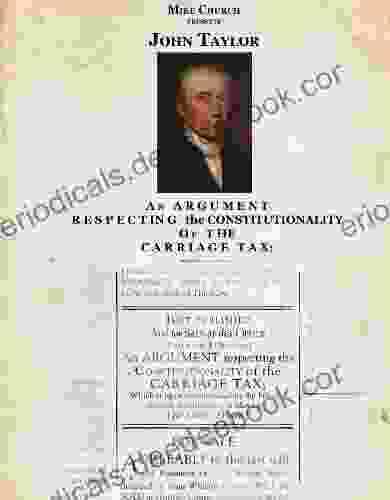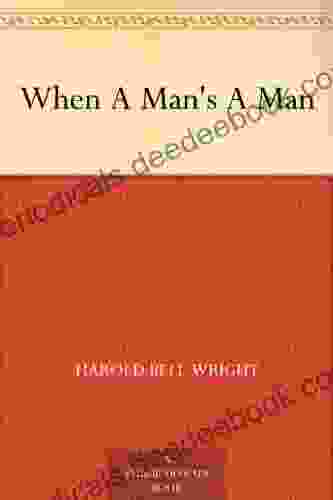An Argument Respecting the Constitutionality of the Carriage Tax

The Carriage Tax was a tax on carriages that was passed by the United States Congress in 1794. The tax was unpopular, and many people argued that it was unconstitutional. James Madison was one of the most prominent opponents of the tax, and he wrote a pamphlet in 1794 arguing that the tax was unconstitutional.
4.4 out of 5
| Language | : | English |
| File size | : | 2916 KB |
| Text-to-Speech | : | Enabled |
| Screen Reader | : | Supported |
| Enhanced typesetting | : | Enabled |
| Word Wise | : | Enabled |
| Print length | : | 46 pages |
| Lending | : | Enabled |
Madison's Argument
Madison's argument against the Carriage Tax was based on the fact that the tax was a direct tax. Direct taxes are taxes that are levied directly on individuals, such as income taxes and property taxes. According to the Constitution, direct taxes must be apportioned among the states according to their population. This means that each state must pay a share of the tax that is proportional to its population.
The Carriage Tax was not apportioned among the states according to their population. Instead, the tax was levied at a flat rate on all carriages. This meant that states with large populations, such as Virginia, paid a much larger share of the tax than states with small populations, such as Rhode Island.
Madison argued that this was unconstitutional because it violated the principle of apportionment. He argued that the Carriage Tax was a direct tax that was not apportioned among the states according to their population, and therefore it was unconstitutional.
The Supreme Court's Decision
The Supreme Court ruled on the constitutionality of the Carriage Tax in the case of Hylton v. United States (1796). The Court ruled that the tax was constitutional because it was an indirect tax, not a direct tax. Indirect taxes are taxes that are levied on goods or services, such as sales taxes and excise taxes. Indirect taxes do not have to be apportioned among the states according to their population.
The Supreme Court's decision in Hylton v. United States was a major victory for the federal government. It meant that the federal government could impose indirect taxes without having to apportion them among the states according to their population. This gave the federal government much more flexibility in raising revenue.
The Carriage Tax was a controversial tax that was ultimately ruled constitutional by the Supreme Court. James Madison's argument against the tax was based on the fact that it was a direct tax that was not apportioned among the states according to their population. The Supreme Court ruled that the tax was constitutional because it was an indirect tax.
The Carriage Tax was a significant event in the early history of the United States. It helped to establish the principle that the federal government could impose indirect taxes without having to apportion them among the states according to their population. This principle has been upheld by the Supreme Court in subsequent cases, and it remains an important part of the American tax system today.
4.4 out of 5
| Language | : | English |
| File size | : | 2916 KB |
| Text-to-Speech | : | Enabled |
| Screen Reader | : | Supported |
| Enhanced typesetting | : | Enabled |
| Word Wise | : | Enabled |
| Print length | : | 46 pages |
| Lending | : | Enabled |
Do you want to contribute by writing guest posts on this blog?
Please contact us and send us a resume of previous articles that you have written.
 Chapter
Chapter Story
Story Genre
Genre Reader
Reader Paperback
Paperback E-book
E-book Newspaper
Newspaper Shelf
Shelf Glossary
Glossary Bibliography
Bibliography Foreword
Foreword Preface
Preface Synopsis
Synopsis Footnote
Footnote Manuscript
Manuscript Scroll
Scroll Codex
Codex Bestseller
Bestseller Classics
Classics Library card
Library card Autobiography
Autobiography Memoir
Memoir Reference
Reference Narrator
Narrator Character
Character Librarian
Librarian Card Catalog
Card Catalog Borrowing
Borrowing Stacks
Stacks Archives
Archives Periodicals
Periodicals Research
Research Journals
Journals Interlibrary
Interlibrary Literacy
Literacy Study Group
Study Group Thesis
Thesis Book Club
Book Club Theory
Theory Textbooks
Textbooks Alex Crowley
Alex Crowley Robert Marsh
Robert Marsh James P Pfiffner
James P Pfiffner Corinne Michaela Flick
Corinne Michaela Flick Karen Leland
Karen Leland Melanie Metzenthin
Melanie Metzenthin Danielle Steel
Danielle Steel D B Lawhon
D B Lawhon Wendy Wax
Wendy Wax Anne Freytag
Anne Freytag Timothy J Demy
Timothy J Demy John Cloud Henry Townsend
John Cloud Henry Townsend Anne Laure Amilhat Szary
Anne Laure Amilhat Szary S D Robertson
S D Robertson J D Cortese
J D Cortese Quinn Larson
Quinn Larson Edward M Lerner
Edward M Lerner Seyom Brown
Seyom Brown Roger Hutchinson
Roger Hutchinson Annie Douglass Lima
Annie Douglass Lima
Light bulbAdvertise smarter! Our strategic ad space ensures maximum exposure. Reserve your spot today!
 W.B. YeatsFollow ·17.8k
W.B. YeatsFollow ·17.8k Herman MelvilleFollow ·6.8k
Herman MelvilleFollow ·6.8k Joel MitchellFollow ·5.2k
Joel MitchellFollow ·5.2k Lee SimmonsFollow ·11.9k
Lee SimmonsFollow ·11.9k Alfred RossFollow ·14.8k
Alfred RossFollow ·14.8k Harry CookFollow ·8.8k
Harry CookFollow ·8.8k Thomas HardyFollow ·19.3k
Thomas HardyFollow ·19.3k Cameron ReedFollow ·6.1k
Cameron ReedFollow ·6.1k
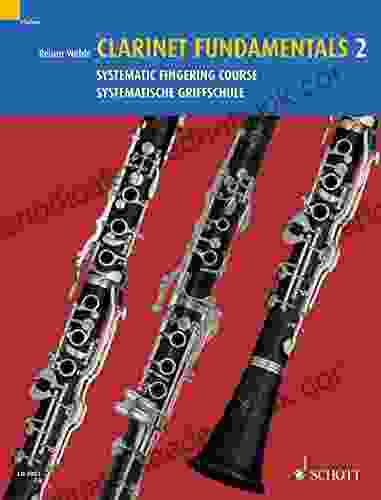
 Anton Chekhov
Anton ChekhovClarinet Fundamentals: A Systematic Fingering Course for...
Welcome to the exciting world of...

 Gage Hayes
Gage HayesSea Prayer: A Haunting and Heartbreaking Story of...
Sea Prayer, the latest...
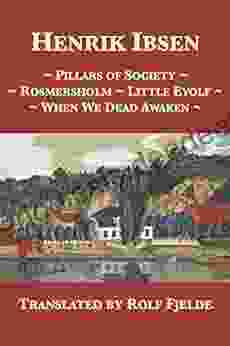
 Henry Green
Henry GreenPillars of Society Rosmersholm Little Eyolf When We Dead...
Henrik Ibsen, the towering...
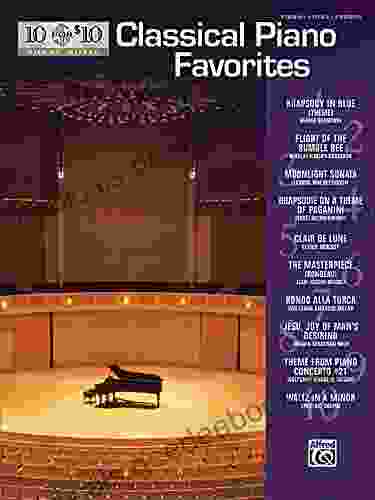
 Robert Reed
Robert Reed10 For 10 Sheet Music Classical Piano Favorites: A...
Learning to play the...
4.4 out of 5
| Language | : | English |
| File size | : | 2916 KB |
| Text-to-Speech | : | Enabled |
| Screen Reader | : | Supported |
| Enhanced typesetting | : | Enabled |
| Word Wise | : | Enabled |
| Print length | : | 46 pages |
| Lending | : | Enabled |


